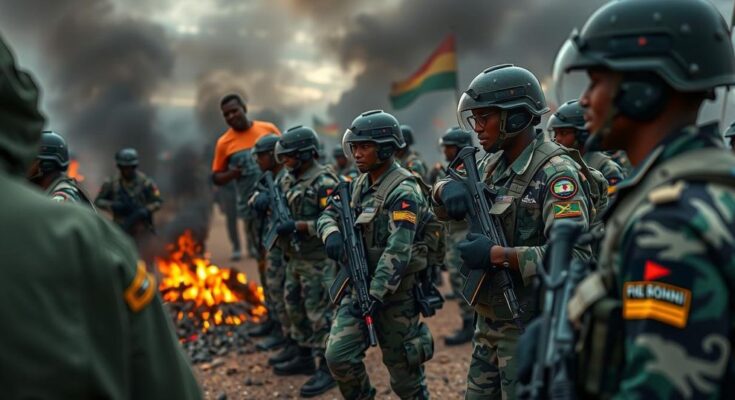Mozambique has deployed military forces to maintain order amid escalating protests against the ruling Frelimo party, following allegations of electoral fraud in the recent presidential elections. Demonstrators in Maputo have faced violent crackdowns by police, with reports of fatalities and widespread unrest. The legitimacy of the election results remains under question, contributing to a charged atmosphere as citizens demand justice and reform.
Mozambique has witnessed a significant escalation in civil unrest following the recent presidential election, where allegations of fraud have prompted protests across the nation. In response to the growing tensions, the government has deployed military forces to support local police in maintaining order in the streets of the capital, Maputo. The demonstrators, largely opposed to the ruling Frelimo party, argue that the election results—wherein Frelimo’s candidate, Daniel Chapo, was declared the victor—were marred by irregularities like ballot box stuffing and voter intimidation. As calls for justice and reforms grow louder, the situation remains volatile, with reports of excessive police force leading to casualties among the protesters. The international community has expressed concern over the state of democracy in Mozambique, prompting calls for an investigative response. Mozambique’s current unrest stems from the Oct. 9 elections, marking Frelimo’s continued dominance since the country’s independence in 1975. The party’s longstanding grip on power has come under scrutiny, particularly regarding claims of electoral misconduct, elevating tensions among opposition groups and citizens alike. Compounded by acts of violence, such as the assassination of opposition leaders, the country faces mounting turmoil. The Constitutional Council’s delay in validating the election results has further fueled public outcry and dissatisfaction within various communities. As security forces increase their presence on the streets and neighboring countries close borders, the future of Mozambique’s political climate remains uncertain, necessitating urgent dialogue and action from all stakeholders involved.
Mozambique, a southern African nation with a complex political history, has been under the rule of the Frelimo party since it gained independence from Portugal in 1975. The recent electoral process, marked by claims of irregularities and unfair practices, has sparked widespread civil unrest. The current political crisis intensified following the Oct. 9 election, where the opposition has raised alarms over the legitimacy of the results and the violent suppression of protests. This ongoing strife is reflective of deep-rooted issues within the country’s political framework, particularly regarding the lack of transparency and accountability within the electoral system.
In conclusion, Mozambique stands at a critical juncture, grappling with the ramifications of a disputed electoral process. The government’s decision to deploy military forces highlights the severity of the situation as public dissatisfaction grows regarding the legitimacy of the recent elections. Ongoing violence and unrest signify a broader call for democratic reforms, and the actions taken by both the government and opposition will significantly shape Mozambique’s future trajectory. Attention from the international community will be pivotal in addressing these challenges.
Original Source: apnews.com




